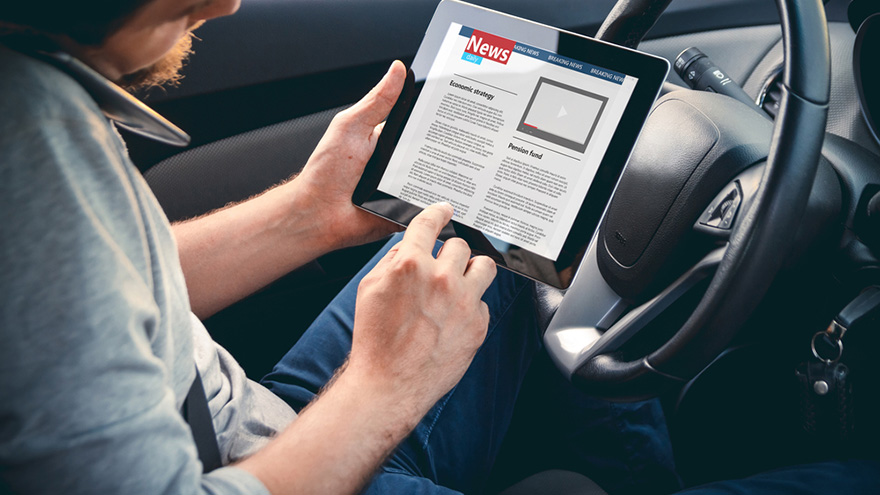Canadians say they drive safely; actions state otherwise

By subscribing, you agree to receive communications from Auto Remarketing and our partners in accordance with our Privacy Policy. We may share your information with select partners and sponsors who may contact you about their products and services. You may unsubscribe at any time.
TORONTO –
Eighty-eight percent of drivers according to a recent survey would give themselves a grade of A or A+ for their driving skills.
But 80% admit to speeding because of an “inadvertent lead foot.”
The study is from Onlia, which offers digital insurance and a mobile app that coaches and rewards Canadians for driving safely.
According to the study, which is titled, Onlia Safety Index, 30% of participants admitted that road rage was one of their driving faux pas. Coming in third behind speeding and road rage was “not checking blind spots as often as necessary,” at 22%.
“This research found some eye-opening gaps between how Canadians feel principally about safe driving versus what their actions indicate,” transportation expert Alex Kelly said in a news release. Kelly is a road safety consultant to Onlia.
Onlia conducted the survey among a representative sample of 1,014 Canadians who are members of the Angus Reid Forum.
Subscribe to Auto Remarketing to stay informed and stay ahead.
By subscribing, you agree to receive communications from Auto Remarketing and our partners in accordance with our Privacy Policy. We may share your information with select partners and sponsors who may contact you about their products and services. You may unsubscribe at any time.
An analysis of anonymous user data from a segment of drivers using Onlia’s safe-driving app, Onlia Sense, re-affirmed the study’s findings, according to Onlia.
The company says the app uses a coaching approach based on “nudge” theory and behavioral economics. With the app, users proactively develop safer driving habits, and they also earn rewards for improved driving behavior, according to Onlia.
The company sourced a paper from Marjan Paula Hagenzieker titled, “Rewards and road user behaviour” showing that rewards are effective at creating more positive driver behavior.
Eighty-nine percent of analyzed Onlia Sense drivers recorded instances of speeding while using the app. That is a 10% increase over self-reported insights, according to Onlia.
The company added that the app gives an average score of B/B+ for many new Onlia Sense drivers. That, according to Onlia, shows a definite discrepancy from self-reported driver behaviors and actual results seen through telematics technology.
Onlia also sourced statistics from Transport Canada showing 1,841 road fatalities, and 9,960 serious injuries in 2017 that resulted in a need for hospital admittance. That caused a physical, emotional and economic burden on Canadians.
But Kelly sourced a Stanford Law School study showing that more than 90% of road collisions are at least in part a result of human error.
“And these findings highlight why it is so important for us to create national awareness and conversations about safe-driving habits,” Kelly said. “In tandem with other road safety measures, such as the Vision Zero safe systems approach, improved driver behavior can have a significant impact on increasing road safety for all road users and decreasing the rate of injuries and fatalities as a result of road collisions.”
The company said 75% of Canadians believe a change in mindset can help change otherwise frustrating commuter traffic experiences. Onlia mentioned “impactful tools” for drivers such as its Onlia Sense app that is available for free on Canadians’ preferred app store.
Onlia Canada chief executive officer Pieter Louter said the company’s anonymous data shows that drivers using the Onlia Sense app are improving driver safety.
Louter sourced Onlia data, which the company said is presented within a 95% confidence threshold, showing that drivers using the Onlia Sense app are improving their overall score over six months.
“And that is music to our ears, bringing us closer to our commitment of making Canada a safer place for everyone,” Louter said. “By coaching and rewarding Canadians for safer driving, our hope is to make Canada’s roads the safest in the world.”
The company also listed small steps drivers can take to improve awareness and “proactively manage their driving skills. One is to leave early to get to your destination whenever possible. Another is to not speed, even if everyone else on the road is.
Other steps from Onlia: Put your phone on airplane mode or Do not Disturb before driving; make it a habit to remind yourself to check blind spots; and reduce stress and road rage through breathing exercises or listening to music or podcasts.


